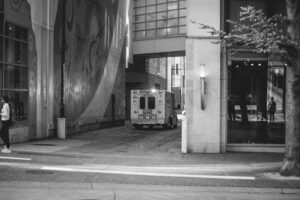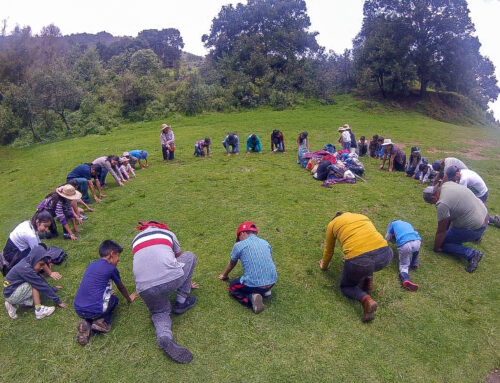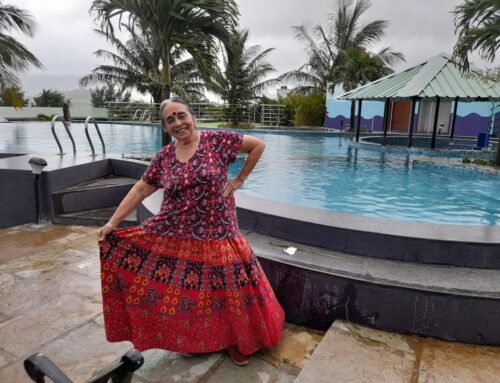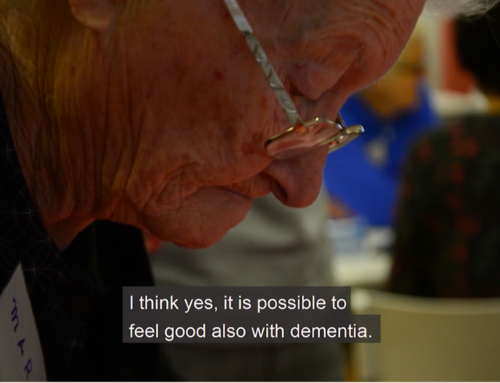In 2022, a press release from the United Nations Development Programme (UNDP) reported that six out of seven people in the world experience feelings of insecurity. The special report (titled New Threats to Security in the Anthropocene) released that year outlined how people in nearly every country have an increased sense of anxiety and are feeling less safe across multiple domains of life due to state surveillance, conflict and violence, systemic inequities, economic uncertainties, climate change, and fear that governments and institutions cannot properly handle societal and global problems. Even in 2024, the social and economic ripple effects of the COVID-19 pandemic continue to be felt around the world. Conflict and violence—both recent and long-standing—have taken loved ones of all ages away from their families, physically destroyed homes and communities, and traumatized thousands of people. Natural disasters have devastated infrastructures and resulted in loss of life. Climate change is affecting lifeways with disproportionate impacts being felt by Indigenous populations and marginalized groups. Furthermore, systemic inequities and global capitalism have long disadvantaged some individuals while affording privileges to others. More people are feeling fearful due to democratic backsliding occurring in multiple world regions. Given this long list of factors that exacerbate individual and societal anxiety, it is no surprise that more of the world is experiencing a sense of insecurity and uncertainty about the present and future.
Uncertainty may also come with older age—clinical uncertainty arising from providers not being able to diagnose with precision due to complex presentations or missing information, uncertainty about financial resources and living situations in later life, uncertainty about who will care for a person as they grow older and near the end-of-life, uncertainty about how you will be remembered after you pass away. There is a prolific and valuable scholarship on (in)security in old age that addresses these important issues from the perspectives of older adults and their caregivers (see Danely 2022; Keimig 2021; Long 2020; Shea Moore and Zhang 2020; Vincent 2021). In this essay, I will engage with what it means for my interlocutors–the collaborators and participants who took part in an ethnographic study focusing on the experiences of Muslim patients, families, and health care professionals during terminal illness and end-of-life care in a suburb of Washington, D.C.–to face serious illness and death in an atmosphere of insecurity and uncertainty.
I conducted this research between 2014 and 2019 with individuals who ranged in age from their twenties to later life, all of whom identified as Muslim. My interlocutors came from diverse racial, ethnic, linguistic, cultural, educational, and socioeconomic backgrounds. From my research, I noted that there were two (long) moments in United States and global histories that contributed to an atmosphere of insecurity and even fearfulness among Muslim patients and their families when they sought care. This essay is framed around these two moments: 1) the events of September 11, 2001 and the backlash against Muslims in the years that followed, and 2) the rise of conservative ideologies and anti-immigrant rhetoric in the United States, especially in relation to the election of former US President Donald Trump.

First responders. Ambulance arrives at the hospital. Photo by Albert Stoynov, Unsplashed, 2023.
Lara Deeb and Jessica Winegar (2015) state that September 11, 2001 served as a pivotal moment not just in domestic and international politics and media, but also in academia, in professional organizations focused on the study of the Middle East and North Africa, and in the discipline of anthropology. Deeb and Winegar (2015) quote a peer talking about the lasting effects of September 11, 2001, even on those who may not have experienced it first hand: “The newer, younger generation is not as affected viscerally by the actual event [of 9/11] itself, and so that conversation [about 9/11-related US engagement with the Middle East] is going to take on a different tone” (50).
Ali¹ was a young man I came to know during fieldwork, while he was making the difficult decision to take his father off life support. He was only a child when the events of September 11 took place, but he had been marked by them just the same, and not just because he was living down the road from the Pentagon at the time. The aftermath of the September 11 attacks also remained vivid to him, namely the stereotyping of Muslims and the polarization of society that took place during that time, as well as the invasion of Afghanistan and Iraq by the US and its allies. These events continued to resonate with him as he made decisions about his father’s care, particularly after it was clear that his father could not live off of a ventilator during the last stages of his disease. Ali looked to leaders at local mosques for guidance and found comfort in having a Muslim physician at the hospital serve as his father’s main provider because this helped him feel better understood and less judged.²
Ali explained that his father did not have an advance directive in place when he entered the hospital, but he and his family knew his father’s wishes for care: “I said I knew my dad’s wishes; I knew what he would want.” At first a non-Muslim physician was treating his father at the hospital. The young man described their encounter: “So he’s like, ‘If I could tell you my opinion.’ And I was like, ‘No offense, but I have completely different beliefs than you.’ So, he said, ‘I understand.’” The physician then arranged for a colleague who identified as Muslim to handle the case. He explained, “And I mean, that was extremely helpful. I mean I’m Muslim and he took the time, so I assumed that he had formulated some thoughts that might have weight.”
I had the opportunity to interview a physician named Dr. Abbasi, who practices in the Midwest and has played an integral role in creating a national professional organization that aims to support Muslim healthcare providers. She noted that the misconceptions about Islam as a “violent religion” that circulated in the US after September 11 made patients fearful to even seek care.” Dr. Mir, a Muslim hospitalist who treats older patients with complex and terminal conditions, recounted that following the events of September 11, he saw more Muslim patients than he had in the past, with some preferring to see him instead of a non-Muslim provider, and others assigned to him in what Arthur Kleinman and Peter Benson (2006) would call (and critique as) culturally competent care. As I have written elsewhere, cultural competence goes far beyond matching patients with providers who may identify in similar ways, and the act of doing so may put patients and their families in more vulnerable positions (Hughes Rinker 2021). Dr. Mir found himself being called upon to not only offer clinical care to aging and dying Muslim patients, but also, at the request of families and other non-Muslim providers, to offer guidance about what is (and is not) acceptable in Islam at the end-of-life. Stating that the latter was not something in his purview as a physician, Dr. Mir refrained from offering such advice.
Dr. Patel, another hospitalist who identified as Muslim, was born and raised in South Asia. Dr. Patel explained that the end of life is a difficult and tender time for patients and their loved ones–it is a time filled with a plethora of emotions and questions. In late 2015, we had a conversation about his experiences caring for Muslim patients at the hospital. This was a little less than a year before the election of former President Donald Trump, who campaigned with the slogan of “Make America Great Again,” stoking the conservative rhetoric that was rapidly growing in the US, Europe, and beyond. Dr. Patel explained to me the following: “There is a group of people today, under the current political climate, who are feeling very vulnerable. They’re going to be very defensive coming into this system. So, to assume that doesn’t interfere with their decision-making [about end-of-life care] is just crazy, right? They’re insecure. They’re scared, they come in and their family member is sick and they’re worried that nobody is going to care.”
This fear and insecurity was only exacerbated in 2017, when former President Trump issued Executive Order 13769 (“Protecting the Nation from Foreign Terrorist Entry into the United States,”in effect from January to March 2017), which denied the entry of citizens from seven Muslim-majority countries into the US. Trump touted on Twitter (now known as X) that the order was all about “Making America Safe.” Imam Mahmoud, an imam with whom I spoke at length about his work as a chaplain at a hospital in Baltimore, talked about his visits with diverse Muslim patients and their families, including those who had come to the US specifically for care that had not been available in their home countries, those who converted to Islam, those who were born in the US to immigrant parents, and those whose families trace their heritage abroad but who have been in the country for a long time. Oftentimes, he explained, families ask him to come to the hospital room with them and their loved one who is nearing death: “Sometimes, it’s just about being present. You don’t even have to say anything. Sometimes that is more comforting to people, the fact that you have an imam in the room with you, just to talk to you or just to be there for you. They would just want you to sit there for a while, so I would just sit there. So sometimes presence is all that they need.” Imam Mahmoud described how families appreciated having someone in the hospital room with them who they thought had a deeper understanding of their perspectives and who would not judge their choices regarding care for their dying loved one.
In closing I want to briefly outline how the theory of cultural trauma may help us think more about how social and political climates can generate anxiety and insecurity during times of serious illness and end-of-life care. This essay has focused on how this climate affects engagement among diverse Muslims with a medical institution, especially as older loved ones near the end-of-life. Jeffrey Alexander states that “[c]ultural trauma occurs when members of a collectivity feel they have been subjected to a horrendous event that leaves indelible marks upon their group consciousness, marking their memories forever and changing their future identity in fundamental and irrevocable ways” (2004, 1). Cultural trauma prompts us to examine “relationships between previously unrelated events, structures, perceptions, and actions” (ibid.). Alexander suggests that once societies can see suffering at the collective level, they can work to “prevent the trauma from happening again” (ibid.). One non-Muslim physician told me that she’d had a pediatric patient who had been admitted for palliative care due to cancer that was progressing. The physician talked with the patient and their parents about options for care, but when one of the parents got up to leave the room, they looked at the patient and said, “Don’t listen to the Christian.” The physician had to balance the patient’s wishes along with their parents’ wishes, given their status as a minor. When I asked the physician how she felt about this comment, she explained that she was not bothered by it–she recognized the privileges that her own identity afforded, and realized that she was in a position of authority and power at the hospital. She understood the parents’ reaction because ultimately, it was their child who was sick. Drawing on the theoretical concept of cultural trauma, the quotes and stories that I shared in this essay may help point us to the ways that devastating events and their aftermath, in addition to political ideologies and priorities, may profoundly impact how individuals and communities engage with the health care system during times of serious illness and for end-of-life care.
Notes
[1] I use pseudonyms and do not provide specific information about my interlocutors in order to protect their privacy.
[2] While Ali preferred to communicate with–and have his father treated by–a Muslim physician, I found that other Muslim patients and their families did not prefer to work with Muslim health care providers for a variety of reasons.
Acknowledgments
I must thank my collaborators and participants for sharing their work and stories with me. My research was supported by the College of Humanities and Social Sciences at George Mason University.
References
Alexander, Jeffrey C. 2004. “Toward a Theory of Cultural Trauma.” In Cultural Trauma and Collective Identity, by Jeffrey C. Alexander, Ron Eyerman, Bernard Giesen, Neil J. Smelser, and Piotr Sztompka, 1-30. Berkeley: University of California Press.
Danely, Jason. 2022. Fragile Resonance: Caring for Older Family Members in Japan and England. Ithaca: Cornell University Press.
Deeb, Lara and Jessica Winegar. 2015. Anthropology’s Politics: Disciplining the Middle East. Stanford: Stanford University Press.
Hughes Rinker, Cortney. 2021. Actively Dying: The Creation of Muslim Identities through End-of-Life Care in the United States. Abingdon: Routledge.
Keimig, Rose. 2021. Growing Old in a New China: Transitions in Elder Care. New Brunswick: Rutgers University Press.
Kleinman, Arthur and Peter Benson. 2006. “Anthropology in the Clinic: The Problem of Cultural Competency and How to Fix it.” PLOS Medicine 3 (10): 1673-1676.
Long, Susan. 2020. “Family, Time, and Meaning toward the End of Life in Japan.” Anthropology & Aging 41 (2): 24-25.
Shea, Jeanne, Katrina Moore, and Hong Zhang, eds. 2020. Beyond Filial Piety: Rethinking Aging and Caregiving in Contemporary East Asian Societies. New York: Berghahn Books.
Vincent, Susan. 2021. “Planning for Old Age in Peru: Count on Kin or Court the State?” Anthropology & Aging 42 (2): 52-67.
Cortney Hughes Rinker is Professor and Director of Global Affairs at George Mason University where she also serves on the Steering Committee for the AbuSulayman Center for Global Islamic Studies.
Cite as: Rinker, Courtney Hughes. 2024. “They’re worried that nobody is going to care:” Anxiety among Muslim Patients and Families during End-of-Life Care” In “Aging Globally: Challenges and Possibilities of Growing Old in an Unsettling Era,” edited by Magdalena Zegarra Chiappori, American Ethnologist website, 7 August 2024. [https://americanethnologist.org/online-content/collections/aging-globally/theyre-worried-that-nobody-is-going-to-care-anxiety-among-muslim-patients-and-families-during-end-of-life-careby-cortney-hughes-rinker/]




